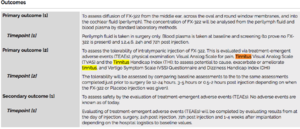From the document:
Quick summary:
- The Planned Phase 2a clinical trial will also explore the efficacy of the drug regarding tinnitus
- About 30% improved word recognition for treated patient versus about 5% for the placebo group (only 23 patients)
- About 20% improved word in noise recognition for treated patient versus about 5% for the placebo group
- Apparently no statistically significant improvements on the audiograms
- Worked well on mice
Comment from Reddit:
Some huge problems.
First, no change in audiogram is major. If the treatment worked, that is, if it regenerated hair cells, that is exactly where you would expect to see the difference.
Speech tests are difficult to interpret. First, they only saw significant changes in 4 patients. I also couldn't find what speech test they used and how many items. This is critical. If you are performing in the mid percentages on word rec, a 30% change is likely not significant and is just test-retest reliability (see the Thornton and Raffin tables). So this result does not excite me at all.
Finally, their biggest claims are from post hoc statistical tests. Which, ew. Also, they aren't explicit about their statistical models, but they should have used mixed effects for this which it doesn't appear they did. So it's likely that some of the variability their model "explained" is incorrectly assigned to a fixed rather than random effect, artificially driving down their p values.
If mouse models translated to human models we'd all be basically cancer free.
Still an interesting company, but these results aren't promising.

 Member
Member



